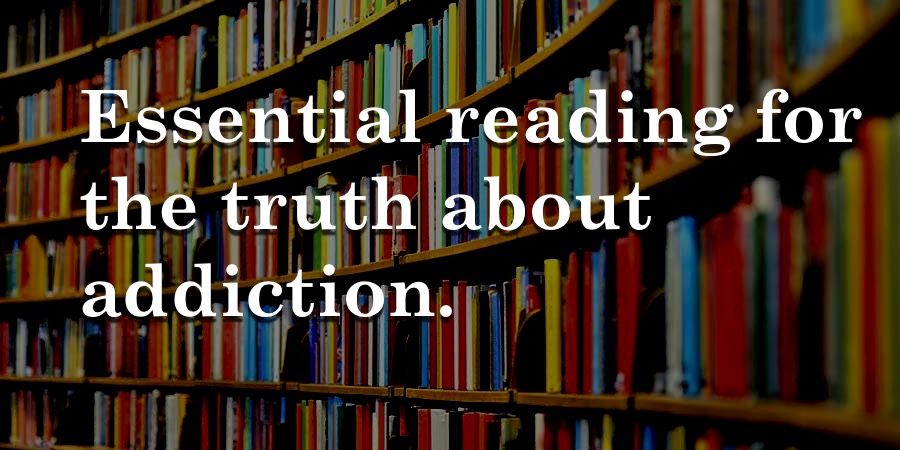
The hysteria and myths about alcohol, other drugs, and addiction runs deep in American culture – and I believe it is causing us to have more problems with alcohol and other drugs. The more people learn the truth, the more we can create a cultural shift that decreases these problems. The following is my study guide for anyone who wants to see beyond all of the harmful myths about drugs, alcohol, and addiction. By reading and discussing these books and articles, you can become a part of the solution.
I’ll start the list first with a shameless plug for my own book…
The Freedom Model for Addictions: Escape the Treatment and Recovery Trap
by Steven Slate, Mark Scheeren, and Michelle Dunbar
Category – Self Help, Research, Addiction Theory
This book is FILLED with research, and it either references or was inspired by many of the books I will mention below, but with one important difference. The rest of the sources I’ll be recommending in this list are either written for the academic world, or to discuss interesting aspects of substance use and theories of addiction – but this book, while including much of the same information, is written as a self-help manual. It speaks directly to the troubled substance user and applies all those ideas and research, trusting the substance user with the facts, so that he can make more informed decisions. No other book that I know of really does this.
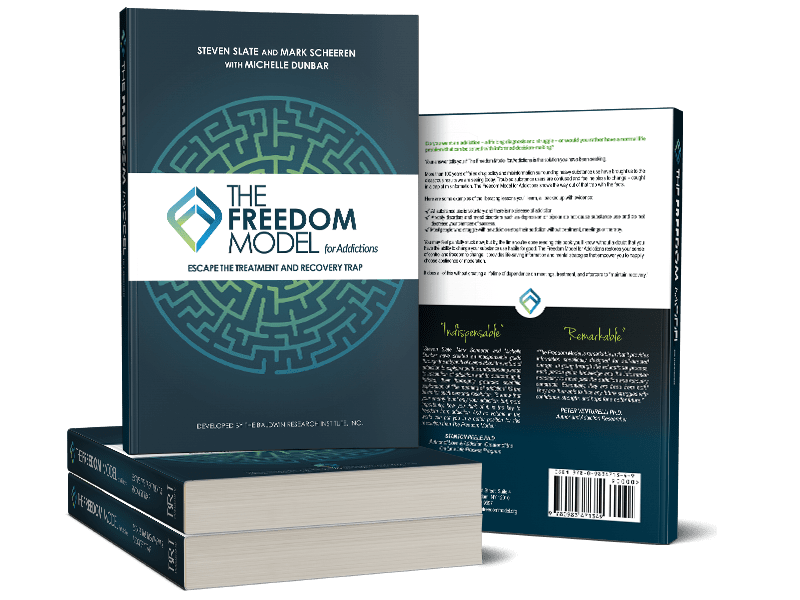 The Freedom Model for Addictions was written to show the substance user that he’s been free to change all along, and to free him from the chains of all the myths of addiction and recovery. It truly shows how to CHOOSE to change.
The Freedom Model for Addictions was written to show the substance user that he’s been free to change all along, and to free him from the chains of all the myths of addiction and recovery. It truly shows how to CHOOSE to change.
My co-author Mark Scheeren spent 12 years living with the people he was trying to help at Saint Jude Retreats, and living within an informal recovery community that sprouted up around the retreats in upstate New York. He also grew up in a 12 step centered family, spending his childhood in meetings. He understands all sides of the recovery world, and was able to escape it, moving on from his own drinking problems without wearing the lifelong title of “recovering alcoholic.” My other co-author, Michelle Dunbar, has worked in every level of our retreats, but most notably helps families to stop playing the charade of – disease, recovery, relapse, repeat with more treatment, and so on – and helps them to just get real and respect each others choices. She authored a special version of The Freedom Model for Families, that is given to those who attend our retreats. We’re serious about making this a choice for people, instead of a coercive game.
So, it’s important to know that we didn’t just read a bunch of research and then invent our approach. It’s the product of nearly 30 years of experience. And since we were on of the only non-12-step programs available for many years, we worked with the absolute toughest cases. Most of our retreat guests had been to multiple rehabs and needed something new. Through helping them, we learned what was really holding people back – addiction and recovery ideology. It’s so negative and fatalistic, and it creates a trap that robs people of the motivation to change. That’s how we got our tagline for the book “Escape The Treatment and Recovery Trap.”
The core concept of addiction is the idea that your drive to use substances is foreign to you in some way. We show that no such foreign drive exists, and thus that no addiction exists. What exists is a personal preference for substance use that is erroneously labelled an addiction. So we don’t redefine addiction in this book – we do away with the concept altogether. The last, and perhaps most damaging, big myth of addiction is the idea that there is something to treat and/or recover from. This book helps you to understand there is no “addiction” to fight, battle, or recover from. Thus there is no process of actions, no magic to be transferred from a sponsor, meetings, counselors, or anti-addiction drug, there is no treatment, and no actionable “plan of recovery” to make addiction go away. But that doesn’t mean there isn’t a solution to heavy substance use habits, problems, and feelings of helplessness. Instead of a battle against addiction, there is just choice based on the belief that you’ll be happier using less or abstaining. That is a process of the mind – of decision-making – and we show the reader how they can rethink their options to get there.
I can’t recommend this book enough, but then again as the co-author, I’m biased.
Link to The Freedom Model System website where you can purchase the book, and find more information on our retreats and courses to implement this system of change in your life.
Link to The Freedom Model for Addictions on Amazon
Quicker Easier Reads on Substances and Addiction
The following sources are quick and easy to read while offering a great deal of insight. They’re all perfect for the layman, and if you don’t presently read often, these sources are perfect to start with because of their brevity. Then if you want to know more, you can get into the longer more academic reads.
Addiction is a Choice
by Jeffrey Schaler
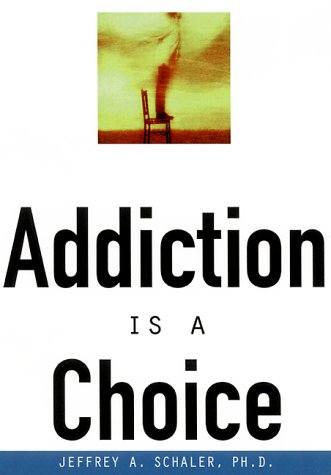 Category – Research, Theory
Category – Research, Theory
The thing I love most about this book is the authors clear and concise writing style. He comes at each issue with pure logic stated in terms that any reader can understand, and systematically deconstructs the myths. As an example, check this little passage from the introduction:
We are constantly being told that cigarettes are addictive, and that this means that teenagers who start smoking will be ‘hooked’ for life.
Meanwhile, millions of heavy, habitual, lifelong cigarette smokers have quit smoking, the vast majority of them without any professional help or ‘treatment’. Inescapably, for these millions of smokers, smoking was a choice—was presumably always a choice, even during the decades when they were smoking every day. How do the proponents of the ‘involuntary addiction’ ideology respond to this evidence? Amazingly, they claim that, while those smokers who chose to quit were indeed able to make that choice, exactly those smokers who have not so far quit smoking are unable to do so! Notice that according to this way of thinking, individuals demonstrate their inability to make a choice simply by making the ‘wrong’ choice, the one we wish they hadn’t made.
That last little bit brings to the fore a little piece of nonsense that anyone could see through in an instant if we took the time to think about. The point he made is one of the most overlooked points in pro-disease rhetoric. Just because people haven’t quit doesn’t mean that they can’t. Yet it is offered up as evidence of addiction all the time. I haven’t started a retirement plan yet. Being 41 years old, I probably should by prevailing standards. Does this mean that I physically can’t start a retirement plan? Most would find that an absurd conclusion. It just means that I haven’t seen it to be important enough to do yet. So it is with “addiction.”
Schaler brings Szaszian thinking to the matter of addiction, using Thomas Szasz’s arguments against “mental illness” against addiction. It’s not a disease because there is no pathology. Further, his chapter on “loss of control” reviews much of the research on this myth and swiftly does away with it too.
The book is easy to read and does a great job of dismissing these and other myths, and replacing them with logic and clear thinking, showing that addiction is freely chosen behavior. Plus, it comes in at only 179 pages, thanks to his brilliant writing style and understanding of the issues. I can’t recommend this book enough.
Buy it on Amazon in multiple formats: Addiction is a Choice by Jeffrey Schaler
Addiction and Choice: Theory and New Data
by Gene Heyman
Category – Research, Academic
This is a journal article that comes in at only 5 pages, but manages to debunk some of the biggest myths of addiction. It is a MUST READ, and perfect starting point for everyone. Unlike most publications of this type, it is clear, concise, and easy to read. Don’t be intimidated just because it’s a journal article, it’s accessible to most readers. Here’s the abstract:
Addiction’s biological basis has been the focus of much research. The findings have persuaded experts and the public that drug use in addicts is compulsive. But the word “compulsive” identifies patterns of behavior, and all behavior has a biological basis, including voluntary actions. Thus, the question is not whether addiction has a biology, which it must, but whether it is sensible to say that addicts use drugs compulsively. The relevant research shows most of those who meet the American Psychiatric Association’s criteria for addiction quit using illegal drugs by about age 30, that they usually quit without professional help, and that the correlates of quitting include legal concerns, economic pressures, and the desire for respect, particularly from family members. That is, the correlates of quitting are the correlates of choice not compulsion. However, addiction is, by definition, a disorder, and thereby not beneficial in the long run. This is precisely the pattern of choices predicted by quantitative choice principles, such as the matching law, melioration, and hyperbolic discounting. Although the brain disease model of addiction is perceived by many as received knowledge it is not supported by research or logic. In contrast, well established, quantitative choice principles predict both the possibility and the details of addiction.
I can’t stress how important it is to know the epidemiological data contained in this paper. Most common knowledge of addiction comes from studying only people who receive addiction treatment. They only make up 10-20% of “addicts and alcoholics.” This gives us a distorted picture of addiction, because it’s incomplete, and because those who receive treatment are taught that they have a disease they must struggle endlessly against it. Most people change their “addictive” substance use habits without treatment. Knowing this is powerful, because it debunks the idea that treatment is necessary, or that it even does anything at all. READ IT!!!
Link to a pdf of Addiction and Choice: Theory and New Data.
Becoming a Marihuana User
by Howard S Becker
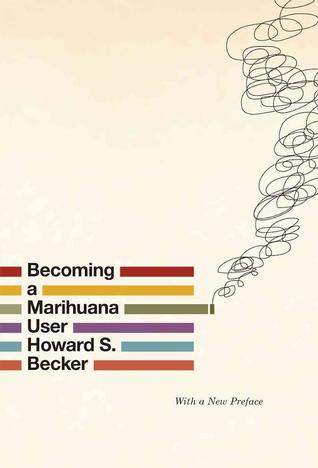 Category – Drug effects, Academic, Sociology
Category – Drug effects, Academic, Sociology
This piece had a profound effect on my understanding of drug effects. The four chapter segment on questioning drug effects in The Freedom Model for Addictions sprouted from the insights I gained from Howard Becker’s work. Here’s an excerpt from The Freedom Model that was inspired by this work:
We talk about pleasure as if it’s an objective thing or a quality inherent in things. This simplistic notion is taken for granted with substances and never questioned. The way substances are discussed, it’s as if a blunt, a Percocet, or a shot of Jack Daniels contains pleasure in the same way that an apple contains nutrients. Nobody seems to realize how deeply this view of inherent pleasure rules the discourse on substance use habits, but it does.
Becoming a Marihuana User was published in 1953 and remains one of the most influential pieces on drug effects to this day. It will help you to question whether drugs are inherently pleasurable or not. You will see drugs in a whole new light after reading it. What he shows is that people have to learn to enjoy the effects of marihuana. And if you have to learn to enjoy it, then I would say it isn’t inherently pleasurable.
Here’s an excerpt:
In summary, an individual will be able to use marihuana for pleasure only when he goes through a process of learning to conceive of it as an object which can be used in this way. No one becomes a user without (1) learning to smoke the drug in a way which will produce real effects; (2) learning to recognize the effects and connect them with drug use (learning, in other words, to get high); and (3) learning to enjoy the sensations he perceives. In the course of this process he develops a disposition or motivation to use marihuana which was not and could not have been present when he began use, for it involves and depends on conceptions of the drug which could only grow out of the kind of actual experience detailed above. On completion of this process he is willing and able to use marihuana for pleasure.
Link to a free PDF of Becoming a Marihuana User
Link to a newly published and beautifully bound copy of Becoming a Marihuana User on Amazon
History, culture and subjective experience: an exploration of the social bases of drug-induced experiences.
by Howard S Becker
Category – Drug effects, Academic, Sociology
Another important paper by Becker shows how and why marijuana use led to many cases of psychosis at one point, why that effect mostly disappeared, and why the same would happen with LSD. Here’s a link to a free PDF of History, Culture and Subjective Experience: An Exploration of the Social Bases of Drug-Induced Experiences. And here’s a link to the citation for that paper at NCBI.
When you read it, consider the contradictory experiences possible with these drugs – a user can have a pleasurable experience, or a terrifying break with reality, when they use these drugs. If this is the case, then that points us toward the possibility that drug effects aren’t the straightforward result of pharmacology. Becker’s answer is that they have much more to do with expectancies; that we learn these expectancies from our culture; and that our culture’s expectancies of drugs change over time and then change the effects people feel when using drugs. I think he hit the nail right on the head.
Some longer, but easier reads on Drugs, Alcohol, and Addictions
These books are a little longer, have great depth, but are still accessible to the general reader.
Diseasing of America: How We Allowed Recovery Zealots and the Treatment Industry to Convince Us We Are Out of Control
by Stanton Peele
Stanton Peele is the most legendary writer and theorist presenting alternative views of addiction. His books are the most accessible to the general reader, and this one is no exception. It provides a great overview of what is believed about addiction, and why it is wrong. Along the way, Stanton provides a more realistic understanding of addiction. The table of contents shows the big important issues he takes on in this book
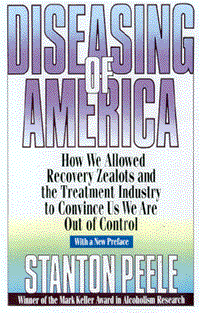 Contents
Contents
Preface to the Paperback Edition
Preface and Acknowledgments
1 Why Addiction Is Not a Disease And Why We Should Care that It Not Be Treated as Such
2 Alcoholism in America
How We Discovered that Alcohol Is Addictive and that So Many People Are Alcoholics
3 Who Says What the Truths about Alcoholism Are?
4 Transforming the Addict into a Role Model, and the Person into an Addict
5 The Addiction Treatment Industry
6 What Is Addiction, and How Do People Get It?
Values, Intentions, Self-Restraint, and Environments
7 How People Quit Addictions, Usually on Their Own
8 Our Confusion over Law, Morality, and Addiction
9 How We Lost Control of Our World
10 Creating a World Worth Living In
Stanton is a walking encyclopedia of addiction. I’ve been blessed to become friends with this amazing man, and can say that he just truly loves this topic, loves thinking about it and figuring it out, he loves devouring research on it, and he strives for intellectual integrity always. He’s upset many colleagues whom he loves and holds in high regard because he refuses to be diplomatic, and instead just tells it how he sees it, for better or worse. I agree with most of what he says, with a few important differences of opinion – but I know that literally everything he says is a conviction he’s arrived at through deep thought and accumulated knowledge, and that if he found reason to change his mind on an issue he would.
His books have inspired countless people to abandon their substance use problems because they contain truth. This book, without being written as a self-help book, has nevertheless been used as a self-help book by many people – and why not? Knowledge is power, and there’s more real knowledge on substances and addiction in this than most certified addictions counselors have. This is a must read!
Link to Diseasing of America: How We Allowed Recovery Zealots and the Treatment Industry to Convince Us We Are Out of Control on Amazon, where it is also free to Kindle Unlimited users.
Saying Yes: In Defense of Drug Use
by Jacob Sullum
Category – Drug Effects
There is far too much anti-drug hysteria out there, and this book is the remedy to it. Sullum is the best journalist consistently writing on drugs and addiction, in my humble opinion. What you can expect to learn here is that drugs are neither as bad nor as good as they’re cracked up to be. Here’s an excerpt:
The main purpose of this book is to contrast drug use as it is described by politicians and propagandists with drug use as it is experienced by the silent majority of users: the decent, respectable people who, despite their politically incorrect choice of intoxicants, earn a living and meet their responsibilities. The lives they lead challenge a central premise of the war on drugs: the idea that certain substances have the power to compel immoral behavior. During his 2000 presidential campaign, Steve Forbes neatly summed up this understanding of drugs as forces of evil. “Drugs are wrong,” he said, “because they destroy the body, enslave the soul, and take away people’s freedom to think and choose for themselves.” According to this view, a drug user is not an independent moral agent because his will has been hijacked by a chemical.
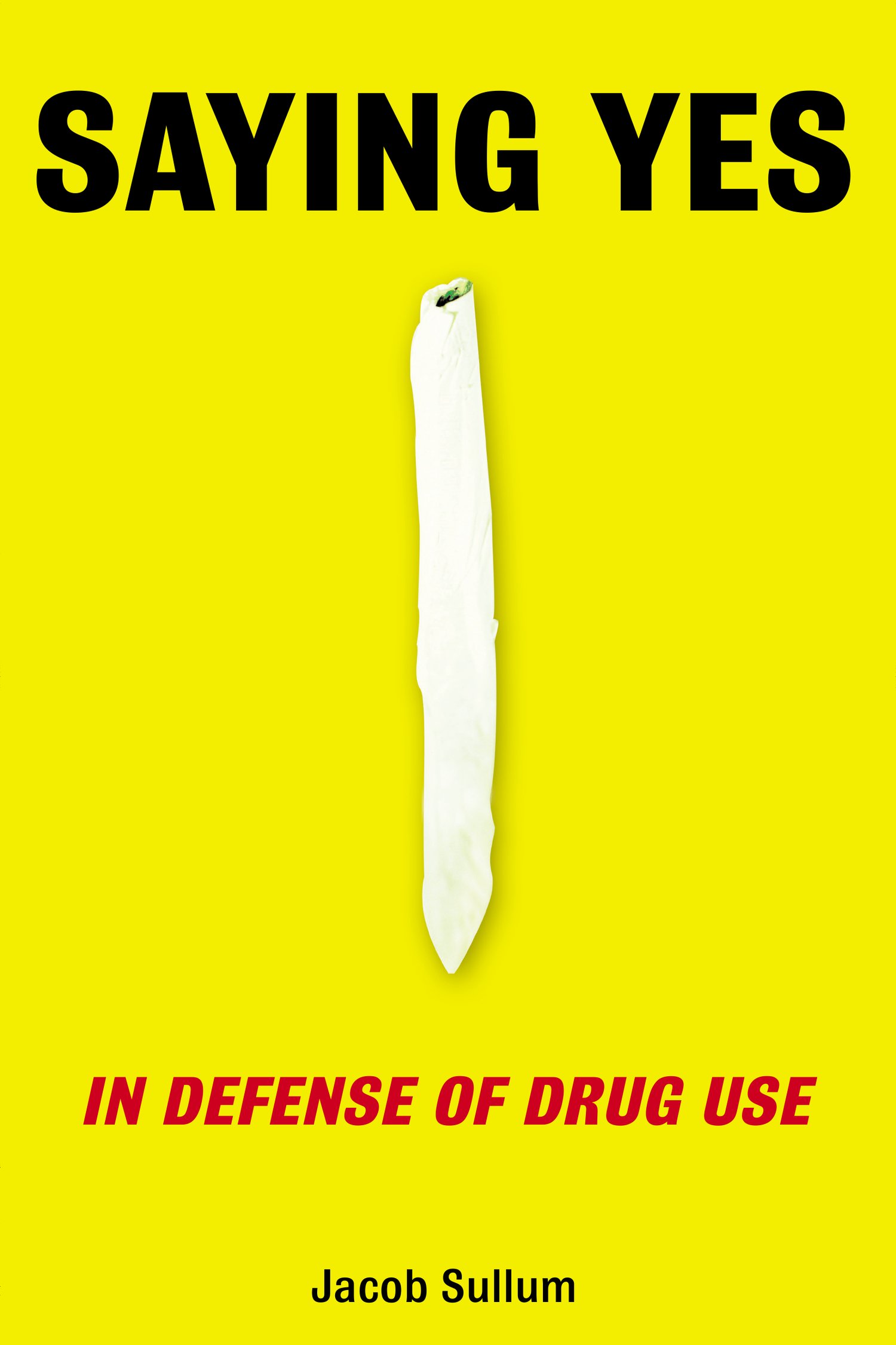
Sullum dubs those views (the idea that certain substances have the power to compel immoral behavior) “Voodoo pharmacology” and methodically tears them apart with hard evidence and sound logic throughout the book. There is no better guide to understanding the effects of drugs and alcohol than this volume.
Unfortunately, I started reading this book after I completed writing The Freedom Model for Addictions. If I’d read it sooner, I would’ve quoted it heavily. That being said, I had already read much (but not all) of the research he presents here. Personally, I was surprised by a chapter where he covers many instances of substances being spoken of positively in religious texts – that was news to me, as I’m not well versed in religion.
I will be stocking the libraries at Saint Jude Retreats with copies of this so that our students can be better informed about drug effects. That might be surprising, since people come to us primarily to achieve the goal of quitting or using less drugs, and this being a book that defends substances. But here’s why the book can be helpful to those who want to change their substance use habits – fear of substances is only a short-term motivator. In the long run, people get drawn back to heavy substance use because they’ve romanticized their effects, and they fear the drugs have enslaved them somehow. Sullum gives useful analysis of drug effects that gets people away from believing their pharmacology is outstanding. He gives people a realistic view that is neither fear-filled nor romanticized. When you no longer romanticize drugs, your overblown view of them shrinks, as does your desire for them. That’s far more helpful in the long-run than fear based on the myths of voodoo pharmacology. I believe such knowledge also gives people a way to implement abstinence as well as moderation. More informed people have the tools to make more fruitful decisions.
Link to Saying Yes: In Defense of Drug Use on Amazon.
Link to Jacob Sullum’s columns on Reason.com.
The Natural Mind: A Revolutionary Approach to the Drug Problem
by Andrew Weil
Category – Research, Drug Effects, Theory
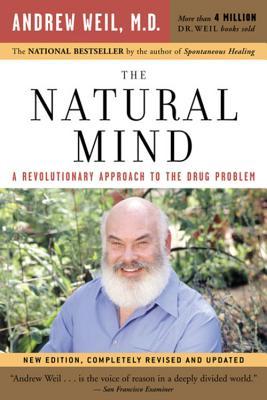 I don’t know what made me read this book. To be frank, the image of Andrew Weil, a goofy nutrition guru with a big grey beard, reads as wacko to me. And the book does have some mysticism in it, which always rubs me the wrong way. Nevertheless, I read it, and it’s great. He was a serious drug researcher, and did the first study of marijuana effects on people who had no experience with or knowledge of marijuana. One of the key insights he came out with is that most drug effects are active placebo effects. It’d take too much time to explain that here, so you’ll either have to read this book or The Freedom Model for Addictions to learn what that means.
I don’t know what made me read this book. To be frank, the image of Andrew Weil, a goofy nutrition guru with a big grey beard, reads as wacko to me. And the book does have some mysticism in it, which always rubs me the wrong way. Nevertheless, I read it, and it’s great. He was a serious drug researcher, and did the first study of marijuana effects on people who had no experience with or knowledge of marijuana. One of the key insights he came out with is that most drug effects are active placebo effects. It’d take too much time to explain that here, so you’ll either have to read this book or The Freedom Model for Addictions to learn what that means.
This book takes a positive view of drugs, and Weil shows that the use of drugs to alter consciousness is a natural human activity going back thousands of years. He also shows that drugs have some value, but that their value is limited. Here’s why that’s important to people who want to address a drug problem – if you understand this, then you can happily say to yourself “I’ve gotten what I can out of these drugs, and can happily move on from them since there isn’t much more that they have to offer me.” Isn’t that a happier way to change your substance use habit than feeling like you “have to quit” because of the negative consequences? It isn’t really a self-help manual, but this book could help you to develop that perspective.
There’s also some really wonderful insight about how our reaction to drug use makes it worse. What I thought would be a wacko book gave me a lot of insight about what I was already doing to help people with substance use problems. That is, I don’t treat people as if their situation is dire and hard to get out of – then they start to believe that themselves, and many happily address their problems and move on.
Link to The Natural Mind: A Revolutionary Approach To The Drug Problem on Amazon
Allen Carr’s Easy Way To Stop Smoking
by Allen Carr
Category – Self Help, Drug Effects, Addiction Theory
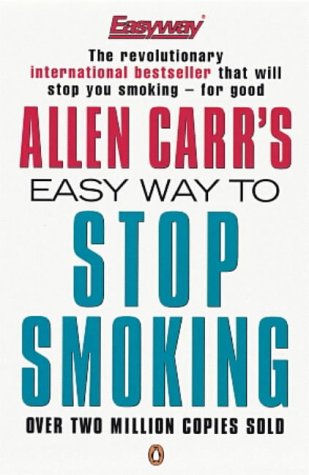 This is a self-help book aimed directly at the task of quitting cigarettes. Over a decade ago, it started going around in my theater group, and tons of my friends happily quit smoking with it. It was recommended to me, I read a little bit, but stopped quickly when he started using disease rhetoric. Years later, an actor friend I was in a play with told me about it, as he is the one who gives seminars on it in New York. As he started explaining it to me, everything made sense, and I said “Oh my god, that sounds a lot like what I teach people about drugs and alcohol!” Now, it’s not exactly the same as what’s in The Freedom Model for Addictions and earlier versions of The Saint Jude Program that I’ve taught, but there is an important similarity. Allen Carr’s Easyway shows that you can stop focusing on deterring yourself from smoking, and see quitting as being the happier option with ample benefits. When you find that frame of mind, quitting is easy. That’s the frame of mind that I found regarding heroin and cocaine, and that’s how I quit using those drugs over 15 years ago with no further struggle.
This is a self-help book aimed directly at the task of quitting cigarettes. Over a decade ago, it started going around in my theater group, and tons of my friends happily quit smoking with it. It was recommended to me, I read a little bit, but stopped quickly when he started using disease rhetoric. Years later, an actor friend I was in a play with told me about it, as he is the one who gives seminars on it in New York. As he started explaining it to me, everything made sense, and I said “Oh my god, that sounds a lot like what I teach people about drugs and alcohol!” Now, it’s not exactly the same as what’s in The Freedom Model for Addictions and earlier versions of The Saint Jude Program that I’ve taught, but there is an important similarity. Allen Carr’s Easyway shows that you can stop focusing on deterring yourself from smoking, and see quitting as being the happier option with ample benefits. When you find that frame of mind, quitting is easy. That’s the frame of mind that I found regarding heroin and cocaine, and that’s how I quit using those drugs over 15 years ago with no further struggle.
Again, Carr calls smoking a disease like heroin addiction, and I don’t like that. But in this book “addiction” and “disease” are just empty words, because everything else he teaches goes against these concepts. He demonstrates all the reasons people continue to choose to smoke, and shows how to question these reasons. He shows that you are in control and have the power to change. His logic is pure brilliance. The great part is that once you understand his logic about smoking, you may be able to apply it to other drugs. Most importantly, he shows that you don’t need to continuously struggle to stay quit. That you can move on quickly. And he shows how to change your reaction to withdrawal, so that it’s enjoyable to with draw. Yes, it’s enjoyable to withdraw from nicotine once you learn his perspective on it.
Link to Allen Carr’s Easy Way to Stop Smoking on Amazon
Link to Allen Carr’s Easy Way website where you can sign up for a one-day seminar to quit smoking. It works!
Longer more academic reads on substances and addiction
The following books are a little tougher to get through, and not necessarily meant for the general reader/layman. But don’t be intimidated if that’s not you – start with the sources above, and then you’ll be prepared to dig into these, and they’ll be well worth your time and effort.
Drunken Comportment: A Social Explanation
by Craig MacAndrew and Robert B Edgerton
Category – Alcohol, Drug Effects, Sociology, Research, Academic
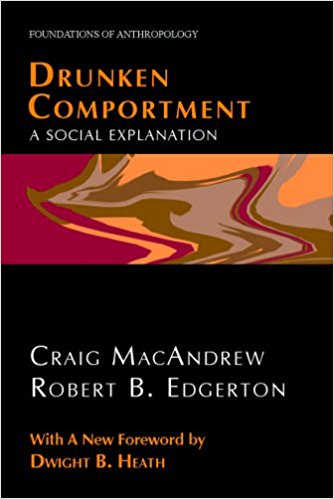 In 2010 Malcolm Gladwell called this “the single most fascinating book he has read in the last 5 years.”
In 2010 Malcolm Gladwell called this “the single most fascinating book he has read in the last 5 years.”
Even though Drunken Comportment is in the academic reads section, I’m going to recommend it to everyone. It was the most exciting and most enlightening book on drug effects that I’ve ever read, and I think that even people who don’t specifically want to know about substances and addiction should read it. It will rock anyone’s world with it’s sociological perspective on the causes of drunken behavior. We take for granted that alcohol makes people violent, aggressive, overly sexual and flirtatious, et cetera. By the time you finish this book you’ll know that it’s all an illusion, and that alcohol does no such thing – but it’s reputation in your culture does.
These authors gathered accounts from all over the world about how people behave when drinking – they looked at various countries, tribes, isolated islands and mountain villages and other pockets of cultures. By comparing them, they showed that there is no uniform response to alcohol. They show that people behave the way their culture has taught and allows them to behave while intoxicated. They show that alcohol’s fabled reputation to “lower inhibitions” is a myth. Once you understand this about alcohol, you’ll see that it applies to all of the drugs. This is a MUST READ!!! It’s definitely mentioned in Sullum’s book Saying Yes, so if you read that first you’ll be introduced to these ideas in a good way – but you’ll still benefit from reading the source.
Link to Drunken Comportment: A Social Explanation on Amazon
The Myth of Addiction, Second Edition
by John Booth Davies
Category – Addiction Theory, Research, Academic
The logical rigor with which John Booth Davies analyzes the theory of addiction reminds me of Jeffrey Schaler. His goals with the book, “simply to put back some humanity and comprehensibility into a process too often seen as arising from the magical power of drugs to change the very bases of human behaviour, regardless of the goals and purposes of the user” seem quite the same as Schaler’s too. This is a tougher read though, but well worth it. I can’t explain where this book goes better than he does in the preface to the second edition, so here it is:
The first edition of The Myth of Addiction appeared in 1992, and expressed my conviction that the view taken of the state we describe as ‘addicted’ is too mechanistic and too remote from the realm of human desires and purposes, too often. Instead of a view of addiction problems as deriving from the interaction of a substance, a setting, and the aims and goals of those who use the substance (i.e. a view that sees addiction as something that people do), the prevailing notions tend to see addiction as something that happens to people; that is, as something imposed from outside by the inescapable pharmacological properties of an alien substance, rather than as a state negotiated through the more understandable channels of human desire and intention. Central to this argument were certain observed facts concerning attribution theory, and the ways in which people explain their actions. From the standpoint of functional attribution, the reasons people give for their drug use are not, and never can be, hard or so-called ‘objective’ data on why drug use happens. Consequently, the use of such statements as criteria against which to validate physiological or other measures, or as factual statements from which to derive diagnostic criteria, is probably misconceived. The Myth of Addiction argues that such explanations are primarily functional. Explaining one’s behaviour as either within, or outwith, one’s control has either positive or negative consequences according to the situation and in a climate of moral and legal censure it makes sense to choose the latter.
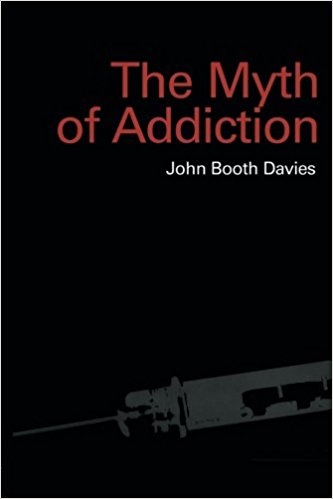 And so, what he masterfully achieves is the understanding that “addiction” is a matter of attributions. That is, our popular explanations of addiction come about because they’re satisfying explanations that serve us in some way, and not necessarily because they’re true.
And so, what he masterfully achieves is the understanding that “addiction” is a matter of attributions. That is, our popular explanations of addiction come about because they’re satisfying explanations that serve us in some way, and not necessarily because they’re true.
This is one of the most brilliant and overlooked books on addiction in my opinion. It’s a must read, but most readers should be familiar with the other works on this list as a prerequisite. There are some mind shattering insights here, and our emotional reactions could lead us to reject them if we go too far too fast. Save this one for after you’ve read the others, but don’t forget to read it.
It’s an academic work, but it isn’t just mental masturbation. Once you understand how attribution comes into play, you can understand how people transform from knowing they’re choosing every single drink/dose of a substance they take, to believing that their substance desire/use is compelled by forces beyond their control.
Link to Myth of Addiction at Amazon
The Cult of Pharmacology
by Richard Degrandpre
Category – Drug Effects, Pharmacology, Research
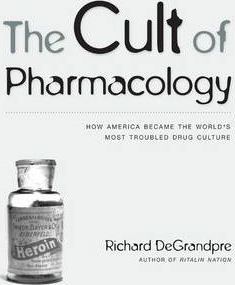 This book really digs deep into drug effects, and it tells a powerful story along the way of how at various times, various drugs have been labeled “angels” and “demons” – and accordingly gone in and out of public favor. He tells a painful story of how effective drugs were made illegal, and replaced by drugs meant to replace the purposes those drugs served – most notably with the opiates being replaced by barbiturates and benzodiazepines – and how the replacements came with even greater dangers. He shows how the medical field took over access to drugs, and how that has warped them in our culture. He uses the drug, set, setting model to pick apart our obsession with pharmacology. And the discussion I found most fascinating was about the mysterious “pleasure center” of the brain – how it was “discovered,” re-conceived, and how our simple understanding of it falls so short. The book covers much of the same ground as others mentioned here, but I haven’t seen any other author tackle the issue of the pleasure center like this, and while the entire book is great, it’s worth the read for this pleasure center content alone.
This book really digs deep into drug effects, and it tells a powerful story along the way of how at various times, various drugs have been labeled “angels” and “demons” – and accordingly gone in and out of public favor. He tells a painful story of how effective drugs were made illegal, and replaced by drugs meant to replace the purposes those drugs served – most notably with the opiates being replaced by barbiturates and benzodiazepines – and how the replacements came with even greater dangers. He shows how the medical field took over access to drugs, and how that has warped them in our culture. He uses the drug, set, setting model to pick apart our obsession with pharmacology. And the discussion I found most fascinating was about the mysterious “pleasure center” of the brain – how it was “discovered,” re-conceived, and how our simple understanding of it falls so short. The book covers much of the same ground as others mentioned here, but I haven’t seen any other author tackle the issue of the pleasure center like this, and while the entire book is great, it’s worth the read for this pleasure center content alone.
Link to The Cult of Pharmacology: How America Became the World’s Most Troubled Drug Culture on Amazon
Controlled Drinking
by Nick Heather and Ian Robertson
Category – Research, Alcohol, Moderation, Academic
If you have any doubts that “alcoholics” can become moderate drinkers, this book will destroy them. The authors present endless examples of research demonstrating that it happens. Along the way, they take a big stab at the myth of “loss of control,” the disease model of alcoholism, and the idea that alcoholics must become psychologically well-balanced if they hope to “recover.” They also seriously question the the idea that the most extreme “alcoholics” must abstain, and only the milder “alcoholics” can hope to moderate. This is a classic, and definitely deserves to be reprinted. Fortunately, used copies are available on Amazon.
When they published this in the early eighties, it was taken for granted that no alcoholic could ever moderate again. This book was blasphemy. Well now, we have over 30 years worth of epidemiological data showing that 50% of former alcoholics become moderate drinkers. And now, there is some acceptance that alcoholics can become moderate drinkers. The recoevry world is still far behind though.
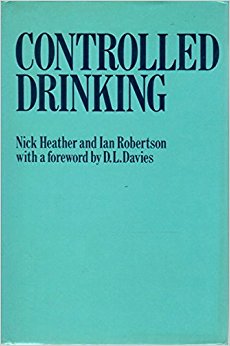 I have issues with almost every book I’ve listed here and choose not to mention them, but I will mention my gripe with this one, as it represents an issue that keeps coming up with books that go against conventional addiction/alcoholism books. The authors present a staggering amount of data that goes against the loss of control/allergy model of alcoholism in which drinking is supposed to be literally “uncontrolled” by the drinkers engaging in it. In effect, they show that even uncontrolled drinking is actually controlled. So there is no such thing as uncontrolled drinking – yet they continue to call some drinking controlled and some uncontrolled. No distinction really exists. All drinking is controlled – that is, when people drink recklessly, they are freely choosing to do so. I understand that some of these bogus terms need to be used at times to speak to people on their level of what they believe about drinking/drugging – I myself used the word addiction often in my own book where we do away with the concept. But I made note that addiction doesn’t really exist as commonly understood. I don’t think these authors explain that “uncontrolled drinking” doesn’t really exist in this book (and my copy is currently lent out to someone, so I can’t check it). So there is a danger that the reader who isn’t careful will still come away with the idea that there is such a thing as uncontrolled drinking. Implicit agreement with recovery mythology like this is a big problem in too many unconventional books on addiction. Another big example that comes up often is people debunking the disease model of addiction, then discussing what they think might be “good treatments for addiction” – you can’t say it’s not a disease then discuss how best to treat the fake disease. (The book from Passages rehabs comes to mind as an example of this – they do a good job of debunking the disease model, then talk about how to treat it)
I have issues with almost every book I’ve listed here and choose not to mention them, but I will mention my gripe with this one, as it represents an issue that keeps coming up with books that go against conventional addiction/alcoholism books. The authors present a staggering amount of data that goes against the loss of control/allergy model of alcoholism in which drinking is supposed to be literally “uncontrolled” by the drinkers engaging in it. In effect, they show that even uncontrolled drinking is actually controlled. So there is no such thing as uncontrolled drinking – yet they continue to call some drinking controlled and some uncontrolled. No distinction really exists. All drinking is controlled – that is, when people drink recklessly, they are freely choosing to do so. I understand that some of these bogus terms need to be used at times to speak to people on their level of what they believe about drinking/drugging – I myself used the word addiction often in my own book where we do away with the concept. But I made note that addiction doesn’t really exist as commonly understood. I don’t think these authors explain that “uncontrolled drinking” doesn’t really exist in this book (and my copy is currently lent out to someone, so I can’t check it). So there is a danger that the reader who isn’t careful will still come away with the idea that there is such a thing as uncontrolled drinking. Implicit agreement with recovery mythology like this is a big problem in too many unconventional books on addiction. Another big example that comes up often is people debunking the disease model of addiction, then discussing what they think might be “good treatments for addiction” – you can’t say it’s not a disease then discuss how best to treat the fake disease. (The book from Passages rehabs comes to mind as an example of this – they do a good job of debunking the disease model, then talk about how to treat it)
Nevertheless the book is an amazing resource of knowledge, and for those who want to go deep on the research, it is essential. It’s also a great example of an addiction myth being debunked for decades, yet we still debate it today. Moderation is possible – the research here proves it. The debate should be over, yet it’s not. This is a sad state of affairs. My recommended prerequisites for this book are Addiction is a Choice by Jeffrey Schaler, and Appendices A and E in my book, The Freedom Model for Addictions.
Link to Controlled Drinking on Amazon
Addiction & Opiates
by Alfred Lindesmith
Category – Opiates and Opioids, Sociology, Addiction Theory
This book started as a research paper in 1938, and grew into a full book by 1947, then was updated in 1968. It’s another example of how a big myth was done away with long ago, yet continues to plague us today. The myth is this: that opiates cause people to be addicted by their pharmacology, and that developing a physical dependence which leads to withdrawal makes a person an addict. Lindesmith debunked this 70 years ago!
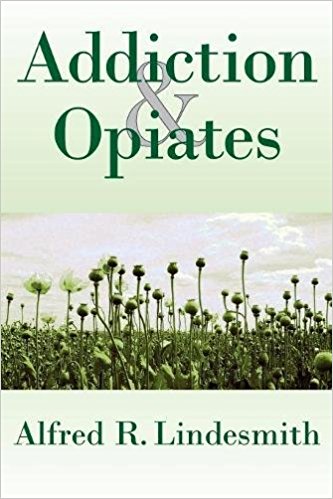 What he shows is that an opiate user needs to learn to see themselves as addicted in order to end up feeling and behaving as if they are addicted. This insight lies at the core of The Freedom Modelfor Addictions, where we show people how to unlearn addiction. His insights still sound new today to most people. Johann Hari, author of the bestseller Chasing The Scream has gone around the world presenting the same ideas the past few years and people find them exciting, enlightening, and believable. The basic argument goes like this – millions of average people come out of the hospital “addicted” to morphine without knowing it after surgery, and they go through withdrawal uneventfully, feeling no desire to seek out more opiates. They do this because they don’t see themselves as addicted! He showed that you have to learn to be addicted.
What he shows is that an opiate user needs to learn to see themselves as addicted in order to end up feeling and behaving as if they are addicted. This insight lies at the core of The Freedom Modelfor Addictions, where we show people how to unlearn addiction. His insights still sound new today to most people. Johann Hari, author of the bestseller Chasing The Scream has gone around the world presenting the same ideas the past few years and people find them exciting, enlightening, and believable. The basic argument goes like this – millions of average people come out of the hospital “addicted” to morphine without knowing it after surgery, and they go through withdrawal uneventfully, feeling no desire to seek out more opiates. They do this because they don’t see themselves as addicted! He showed that you have to learn to be addicted.
Importantly, he argued and demonstrated that people who are naive to “addiction” are protected from it, and those who are “aware” of the addictive powers of the opiates are more likely to become “addicted” to them. But what do we do today? We try to create all sorts of awareness of the addictive power of these drugs. In so doing, we’re creating more addiction. We should know better, and this is the book that needs to be read by more people with power and influence of the messaging about addiction.
Lindesmith was a sociologist, derived his theories from interviews with 50 opiate addicts, and a review of other relevant research literature. My only issue with this book is that he thought that once you learn to feel addicted to opiates, you can’t unlearn it. He may have made this error because he only interviewed people who were actively “addicted” and didn’t really look so much into those who moved beyond their “addictions.” You can unlearn addiction though – I did it myself, and have personally seen hundreds of people do the same.
This old book is more relevant to addressing the current “opioid/heroin epidemic” than anything written more recently. Read it. Understand it. And get into the hands of anyone with any amount of influence over the national discourse on addiction.
Link to Addiction & Opiates Lindesmith Opioids on Amazon
The Truth about addiction, drugs, and alcohol is out there…
In fact, the truth has been out there for decades. But it’s gone unnoticed by the mainstream. Myself, Mark Scheeren, and Michelle Dunbar compiled these truths in The Freedom Model for Addictions to help people escape these harmful myths, so again – read that book! I’ll be adding to this reading list over time as I decide on what else is worth recommending.

You might add the Non 12 Step News a free weekly publication from Your Empowering Solutions at http://www.non12step.com that’s been around about 10 years now.